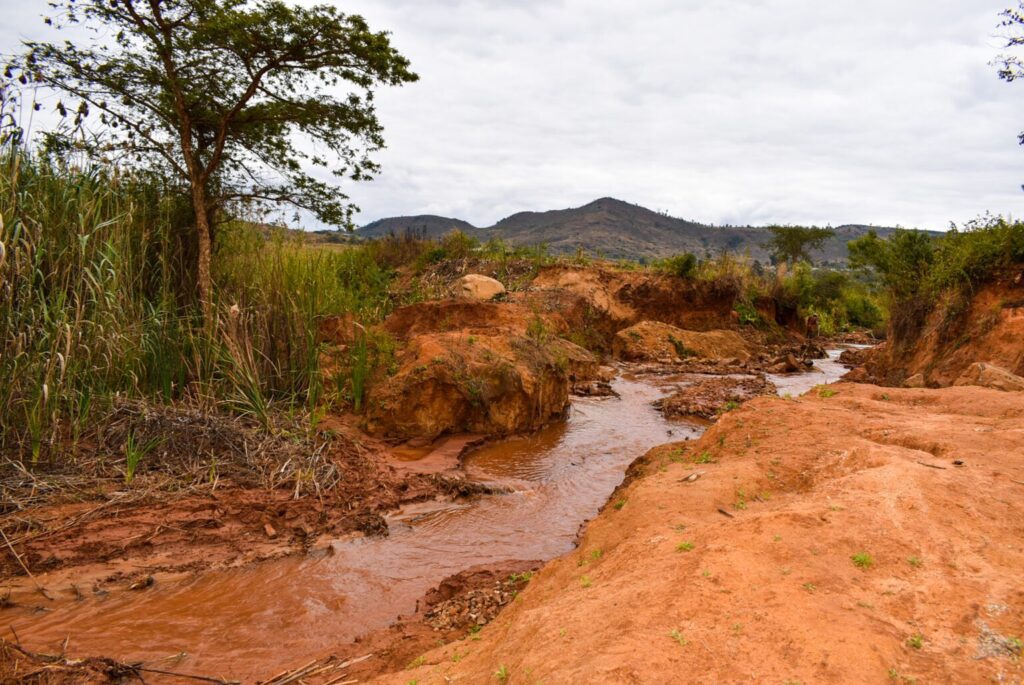Armies of excavators and dump trucks carving deep, terraced ruts into and around hills, mountainsides and waterways are a common sight in Zimbabwe. For locals, the scars of large, industrial mining operations offer frequent reminders of the environmental toll.
Public anger among Zimbabweans has risen steadily in recent years amid accusations of Chinese mining companies committing serious crimes — ranging from murder, rape and forced evictions to pollution and loss of habitats — sometimes with few or no legal consequences.
Journalist and human rights advocate Tendai Mbofana recently raised alarm when he shared a video on October 21 of a Chinese mining operation near his home in Redcliff. The video, which was widely shared across Zimbabwean media outlets, showed heavy equipment digging next to the Cactus Port Dam, leading Mbofana to warn of a serious threat to the ecosystem along the Kwekwe River.
“The only word that I can think of right now to describe these Chinese mining activities in Redcliff is that it’s appalling. It’s reprehensible,” he told The Public Eye newspaper. “We cannot surely call ourselves an independent, sovereign, self-governing state when we allow foreigners to come into our country and do pretty much what they want.”
Chinese-owned companies control an estimated 90% of Zimbabwe’s mining industry, according to the Harare-based Centre for Natural Resource Governance (CNRG), an organization that seeks to support communities affected by mining. It has reported on mineral extractions worth billions of dollars annually to Chinese mining companies, including $2.79 billion in 2023.
“Over the past decade, CNRG has led efforts to investigate and document the environmental, social, and economic effects of mining in Zimbabwe,” the organization said in an October 14 statement. “Our research … consistently reveals that many foreign mining operations, including those involving Chinese capital, occur in [sensitive] environments, circumvent regulation, lack transparency and bribe officials to weaken their oversight role.”
Mbofana said mining in Redcliff is destroying landscapes and poisoning a water source that supplies commercial and subsistence farmers downstream.
“Cactus Port Dam is a very important dam for Redcliff,” he said. “The Kwekwe is vital for agriculture, for flora and fauna in aquatic life, but that is all under threat by these Chinese activities. We are going to be left behind with unusable land and mountains that have been mutilated.”
Mbofana’s video set off stern criticism from citizens and environmental and civil society activists who say Chinese companies are plundering the country’s natural resources with little oversight or accountability.
“This is not investment, it’s daylight environmental terrorism,” Rodreck Kudakwashe, a prolific Harare-based social commentator, posted on X on October 21. “The Chinese systematically strip Zimbabwe of its resources and mortgage our future under the guise of economic development.”
Mbofana reported “a massive blast during the night that shook homes across Redcliff and filled the air with suffocating dust” in an October 22 article on the Harare-based NewsHawks website. “This was not an isolated incident. Residents say these blasts have become a regular nightmare.
“If the mining continues unchecked, contamination and siltation will inevitably destroy the livelihoods of countless farmers and threaten food security for families dependent on small-scale agriculture. Once the dam and river are polluted by mining waste, it will take generations to recover, if ever.”
Citing Chinese lithium extraction in Zimbabwe’s Bikita region, journalist Marcus Mushonga said China’s resource-for-infrastructure model has raised alarms about exploitation, sovereignty and sustainability.
“Across Africa, Chinese mining operations have been linked to environmental destruction, labor violations and disregard for local communities,” he wrote in an October 22 article for the South Africa-based Centre for African Journalists news agency.
“In Zimbabwe, the partnership between the state and Chinese entities — often described as opaque and unaccountable — has left many communities disenfranchised and ecosystems degraded.”

